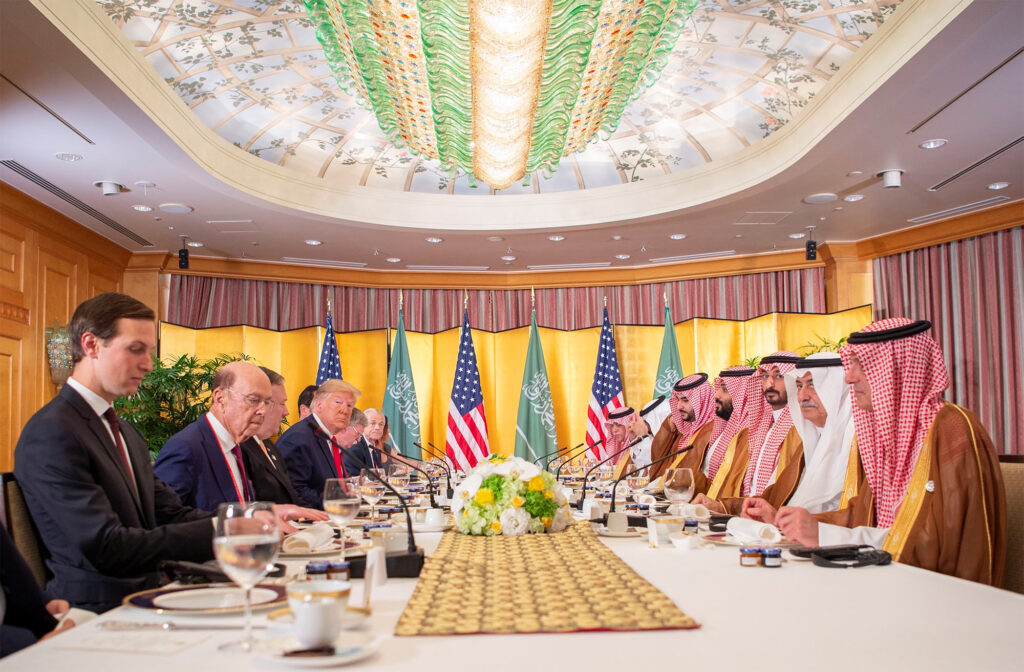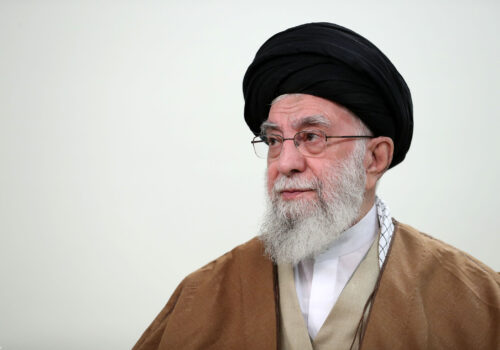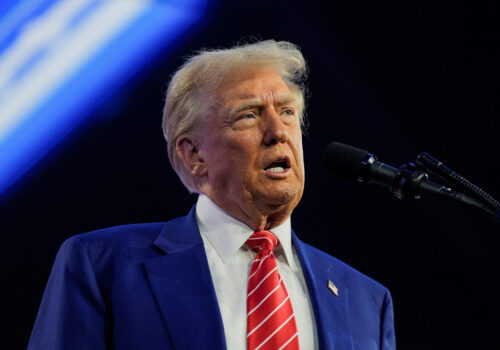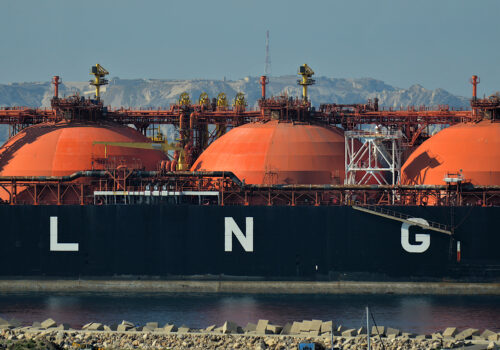A US-Saudi deal without Israel? Here’s what the US should ask for.
For years, the outlines of a potentially groundbreaking deal involving the United States, Saudi Arabia, and Israel have been well known. US President Donald Trump deputized a team to pursue this deal even before his inauguration, signaling the Abraham Accords’ top-tier position among his administration’s priorities. But the dramatically and continually shifting political winds in Israel, the kingdom, and among Palestinians may mean Saudi Arabia continues to press for a different kind of compact between just Riyadh and Washington.
The agreement that was under discussion with the Biden administration would have guaranteed that the United States would open the valve on arms sales to Saudi Arabia and maintain a troop and equipment presence to deter Iran-backed action against the kingdom. It would also have started a US-Saudi partnership to develop Saudi Arabia’s civil nuclear energy program (enrichment was still a point of debate) and to cooperate on artificial intelligence and emerging technology.
These discussions seemed oddly devoid of benefits to the United States. One benefit touted was locking Saudi Arabia into a commitment to buy weapons platforms from the United States instead of from China. However, achieving this does not require a commitment of US troops in the region nor a joint nuclear program. It only requires that the United States approve its own arms sales and speed up its own epically slow foreign military sales process.
The reason for this lopsidedness was that the United States saw the biggest prize as Saudi normalization with Israel, which would unlock economic and social integration projects across the Middle East, South Asia, and parts of Southeast Asia and Africa. However, Israel’s opposition to a path toward a Palestinian state is as intransigent now as Saudi Arabia’s insistence on it as part of any normalization.
With Trump now in office, charging aggressively into foreign policy dealmaking on a number of fronts, the narrative has shifted on whether a Trump presidency could deliver a stronger security agreement with Saudi Arabia that includes the hefty asks from the kingdom but does not include normalization with Israel. Yes, it is possible that Trump can secure such a deal. But should he?
A stronger US-Saudi relationship would be beneficial for both countries across a host of issues and sectors, but alliances imply mutual responsibility. Saudi Arabia is not asking for the equivalent of a NATO Article 5 security guarantee, because the responsibility to defend the United States would then apply to Riyadh. Saudi Arabia would ideally like the United States to guarantee its security but does not want to commit to supporting US security or to making hard choices about China. The latter would have to change.
Without normalization with Israel, the previously proposed agreement with Saudi Arabia requires too much and offers too little. The deal will need to be sweetened. Here are some ways to do so.

Gain greater Saudi support for US policy on Iran
Short of normalization, Saudi Arabia should be asked to stop using rhetoric about Iran or Israel that creates any confusion about the kingdom’s allegiances. For instance, at a November Arab League summit, Saudi Crown Prince Mohammed bin Salman spoke about the need for international actors (read: Israel and the United States) to respect Iran’s territorial integrity. Such statements are a message to Washington that the lack of an upgraded US-Saudi defense agreement is pushing Riyadh further toward Tehran as a hedge. A US security guarantee should require unequivocally picking a side.
Saudi Arabia’s détente with Iran should be encouraged in the interest of regional stability, but the relationship should not deepen in any way that puts the US military or economy at risk. A cold peace is fine unless and until the Trump administration signs a deal with Iran. Any suggestion that Saudi Arabia’s détente with Iran creates the opportunity for the kingdom to serve as a mediator in potential US-Iran talks is a fallacy; Iran will not trust Saudi Arabia to play this role.
Because the future of US-Iran relations is unknown, the ask of Saudi Arabia on its Iran policy should be twofold: First, in the event that US military action against Iran is necessary, a US-Saudi agreement should stipulate that the kingdom will permit the use of its airspace, bases, ports, and other logistics mechanisms for US military operations.
To discourage Saudi leadership from engaging in risky behavior vis-à-vis Iran, a US security guarantee for Saudi Arabia should also require a degree of Saudi skin in the military game. The agreement should stipulate that the kingdom will support any US military operations in the defense of Saudi Arabia with some level of troops, equipment, and funding.
Second, if Trump secures a new deal with Iran, the United States should request that Saudi Arabia pledge to support the US plan to roll back Iran’s nuclear program and its network of proxies. Such a deal might ask Saudi Arabia to invest in Iran, which would likely be welcomed in Riyadh. Iran presents a large potential market for products including aluminum, phosphate-based fertilizers, refined petrochemical derivatives that Iran does not have the technology to produce, and even high-end dates.
If the Trump administration strikes a deal with Iran, the possibility of bringing Iran’s oil onto the legitimate market would drop the per-barrel price, barring other global disturbances in the supply chain. While this would go against Saudi Arabia’s economic goals, this could be offset by the prospect of Saudi-Iran joint ventures to upgrade Iran’s extraction and refining industries for a number of products.
Help stabilize the Middle East
Saudi Arabia has worked with the United States on stabilizing the Middle East throughout the years on a host of issues involving Lebanon, Syria, the Palestinians, Iraq, Iran, and Sudan. Saudi Arabia has been at the political table in good faith in Yemen for over two years now, per the United States’ request. One notable divergence from this record was Riyadh’s rift with Qatar, which benefited Iran, as the first Trump administration repeatedly reminded Saudi Arabia. As part of a US-Saudi agreement, the kingdom could be asked to commit to participation in future regional stabilization efforts and, as importantly, to refrain from those that contradict US objectives.
Strengthen the US-Saudi diplomatic partnership
The United States and Saudi Arabia have successfully cooperated in pursuing mutual foreign policy goals for years. This diplomatic cooperation could be enshrined as part of a new US-Saudi agreement.
The first US-Saudi joint global diplomacy was to rally international support for kicking the Soviets out of Afghanistan in the early 1980s. This joint work was expanded to counter Soviet influence in Africa. In recent years, the United States and Saudi Arabia have divided and conquered, engaging the countries with which they hold sway, to build coalitions like the Global Coalition to Defeat ISIS and the Saudi-led Islamic Military Counter Terrorism Coalition. For a while, Saudi Arabia helped the United States keep Bashar al-Assad’s Syria out of the Arab League. Saudi Arabia has to tried to convince Russia not to sell weapons to Iran and tried to get a cease-fire in Sudan when the United States effectively lacked a Sudan policy. For several years now, the United States and Saudi Arabia have worked together to try to convince Israel to agree to a plan for a Palestinian state.
In other instances, like the 1973 oil crisis and on topics like military intervention in Iraq, backing of parties in the Syrian Civil War, Saudi Arabia’s war in Yemen, and Saudi military acquisition projects with Russia and China, Saudi Arabia has pursued foreign policy goals that counter US interests. A US security guarantee for Saudi Arabia should come with a Saudi guarantee that Riyadh will not contradict US efforts on the ground in places where the United States has stated and clear foreign policy goals. This acknowledges the valid Saudi complaint that US policy has lacked clarity in recent years on files including Syria and East Africa. This lack of clarity is for the United States to fix.

Encourage Saudi Arabia to expand defense cooperation with the US—not China or Russia
While the predominant obstacle to US arms sales to Saudi Arabia has been executive and congressional holds and the cumbersome US foreign military sales process, there are important asks the Trump administration can make of the kingdom in this arena.
First and foremost, Saudi Arabia’s cooperation with China in the defense space should be curtailed. China and Saudi Arabia have joint manufacturing facilities for drone and missile component production and collaborate on counter-drone technology and cybersecurity. If the United States is to provide a security guarantee of any sort to Saudi Arabia, there can be no space for China in these sensitive areas. The premise, oft-cited by Saudi interlocutors, is that the United States is the kingdom’s security partner while China is the economic partner. This feeds the faulty assumption among isolationists in Washington that Riyadh’s economic partnership with China does not bleed into the defense space. This hasn’t been the case for years now, and Saudi-Chinese cooperation in the defense sector should not be allowed to continue as part of any US-Saudi security partnership.
Likewise, any potential deal for Riyadh to collaborate with Russia to domestically produce advanced air or land defense systems in Saudi Arabia should be prohibited. In the past, Saudi Arabia flirted with purchasing the S-400 air-defense system from Russia and used this possibility as a lever in conversations with Washington about other policy issues. The potential for such purchases should be prevented as part of a US-Saudi agreement.
The United States competes for arms sales in the Gulf even with longtime allies, and this sector dominance is important because this purchased military equipment serves as plug-and-play capability augmentation for the US military in the region when necessary. The United States should certainly not cede this market to Russia, even as its relations with Moscow shift. The good news is that Saudi Arabia does not want to go the Russia route. But the United States has stood in its own way. I’m told that the National Security Council Policy Coordinating Committee has recently started conversations about reforming the US foreign military sales process. That will hopefully make it easier for US Central Command to increase interoperability with partners that have been asking for this, including Saudi Arabia.
Saudi Arabia seeks to develop a domestic defense industry. This goal should complement but not compete with US arms sales to the kingdom. US companies are active in joint ventures with Saudi Arabia’s state-owned defense contractor SAMI to build and maintain aircraft, drones, and missiles, as well as to integrate systems, in line with Riyadh’s National Industrialization and Military Logistics Program. Yet, Saudi Arabia has made offset requirements more difficult for US companies to meet, demanding technology transfer in areas where US companies have invested heavily in research and development. The United States should ask that these offset requirements for US firms be relaxed.
To ensure that Saudi Arabia’s development of its own defense industry does not run afoul of US interests, the United States could request as part of a security agreement deal that Riyadh vet future defense partnership and purchase arrangements with third countries through a joint US-Saudi steering committee.
Make Integrated Air and Missile Defense a reality
Integrated Air and Missile Defense (IAMD) is a specific long-time objective of the United States that should be cemented in any US security guarantee granted to Saudi Arabia. The goal of creating a common operating picture for missile defense capabilities across the Gulf, and creating a central command-and-control mechanism for responding to threatening missile arsenals in the region, first emerged in the early 2000s and was codified in the 2019 National Defense Strategy. The kingdom is not alone in dragging its feet on this project; mistrust among Gulf Cooperation Council (GCC) states has made them all wary of exposing vulnerabilities in their air defenses and sharing intelligence with their neighbors. Saudi Arabia has had additional concerns about being expected to foot the majority of the bill for establishing this defense umbrella across the Gulf. But as the largest landmass of the GCC, this is inevitable; Saudi Arabia has more airspace that needs protecting.
Saudi Arabia previously invested in Chinese and Russian radar and counter-drone systems such as the Silent Hunter and Pantsir that cannot be integrated into a US-led IAMD network. Saudi Arabia can be asked not only to participate fully in IAMD advancement but to act alongside the United States in encouraging progress on it. In December 2024, the Department of Defense awarded the Johns Hopkins University Applied Physics Lab a contract for research and engineering support to the IAMD project, showing that the Pentagon is putting its own money where its mouth has long been. Saudi Arabia could be asked to do the same, particularly since the overarching objective is making the Gulf, not the United States, safer. Without IAMD, the job of providing security to Saudi Arabia is a much larger lift. More robust participation in IAMD implementation should be a requirement in any upgraded US security assurances for the kingdom.
Beyond IAMD, the Gulf states (except for Bahrain) have also dragged their feet on participation in maritime joint task forces to protect the waters of the Middle East. A US-Saudi security agreement should mandate full Saudi participation in existing and future US-led joint task forces and mechanisms like, for example, the Comprehensive Security Integration and Prosperity Agreement, focused on securing the land, air, seas and networks of the region.
US firms should be the first choice in all contracts let in Saudi Arabia’s defense sector if Washington grants the kingdom a security guarantee. As part of the agreement, the two partners should agree on the conditions in which a non-US partner would be selected.
Cooperate on counterterrorism
It is unfortunate that indicators point toward an uptick in terrorist recruitment and planning in 2025. The United States will likely soon seek to reinvigorate coalitions to counter a resurgent terrorist threat.
As part of a US-Saudi agreement, the United States could ask for a commitment from the kingdom to continue or upgrade intelligence sharing, financial cooperation, collaboration between law enforcement agencies, and joint counterterrorism task forces to conduct operations against terrorist organizations. In May 2023, the United States signed the latest iteration of the 2008 Agreement for Technical Cooperation to help the kingdom build skills to protect its critical infrastructure from terrorists. This could be reviewed for any desired edits or additions.
The United States should also ask Saudi Arabia to commit to a serious effort, both diplomatic and incentive-based, to bring other countries on board with future coalitions and task force efforts as necessary.

Collaborate on a civilian nuclear program
Saudi action toward a civilian nuclear program has ebbed and flowed in the past decade, as has US openness to supporting it. A US refusal to work with Riyadh on its post-oil plans for nuclear energy production will not result in Saudi Arabia abandoning these plans. It will simply choose another partner, and several countries have offered to help, including China, South Korea, and France. It is in the United States’ interest to have a hand on the controls of a Saudi nuclear program rather than zero visibility into it. US involvement in building a Saudi civilian nuclear program would allow the United States to build in safeguards to the program that would not be possible if Saudi Arabia partners elsewhere. Chief among the benefits for the United States would be oversight of Saudi Arabia’s safety, security, and nonproliferation standards, as well as gatekeeping access to this program.
If the Trump administration agrees to the kingdom’s request to pursue a civilian nuclear energy partnership as part of a larger deal involving a security pact, the United States should have extensive oversight of the program.
The Saudi Aramco model, in which US technology and expertise (and US control over both) formed the basis of a company gradually turned over to Saudi management, can be a theoretical blueprint for maintaining US oversight of the program for a period and eventually handing the program over to host country control as US and Saudi comfort dictates.
A “123 agreement,” named after Section 123 of the US Atomic Energy Act of 1954, should be a requirement. A 123 agreement requires congressional approval as well as the partner country’s commitment to nonproliferation, adherence to International Atomic Energy Agency safeguards, and limits on enrichment before the United States can sell nuclear energy technologies to another country. The reason Saudi Arabia gave the United States for not agreeing to the additional “gold standard” protocol foregoing enrichment is that the limitations in the Iran nuclear deal were fewer than this protocol, and it made no sense for the United States to impose more restrictions on a partner than it imposed on Iran. This is fair. But the answer is not to downgrade the ask of Saudi Arabia but to aim in any negotiations with Iran for Tehran’s compliance with the same level of terms and commitments outlined in section 123 of the Atomic Energy Act. The United Arab Emirates (UAE) and Morocco, both members of the Abraham Accords, are US partners in 123 agreements. And the UAE and Taiwan, both with strong security agreements with the United States, are signatories to the US gold standard.
As a US security guarantee for Saudi Arabia would also be expected to protect civilian nuclear facilities that would present an enticing target for enemies, the United States should ask for a deciding vote on the activities that are conducted at the facility. A facility that does not conduct enrichment is a less attractive target for Iranian aggression than one that does. Saudi Arabia could perhaps become the breaker of ground and a model for small modular reactors, in partnership with the United States.
Lower energy prices
In Riyadh, a senior official with an energy portfolio told me, referring to oil prices, “Get ready. One hundred [dollars] is the new forty,” indicating that the kingdom would not make moves to lower oil prices for the foreseeable future. Trump has already challenged that stance.
Washington and Riyadh should start a renewed conversation about stabilizing oil markets, a goal Saudi Arabia says is its priority as the leader of the OPEC cartel. Saudi Arabia’s domestic development budget is tied to a price per barrel. Similarly, the Trump administration’s goals for boosting the US economy will require cheap oil to drive growth. As part of the security agreement, a sweet spot on oil prices should be agreed upon.
It is important to note here that if a US ask for increased Saudi oil production is tied to plans to remove Iranian oil from the market, Saudi Arabia will expect a US guarantee of the kingdom’s security to be in place before it boosts output. In October, Iran reiterated threats to retaliate for Israeli or US strikes on its homeland by striking Saudi Arabia, a threat the Saudis take seriously. If they are asked along with other Gulf neighbors to dip into spare capacity to replace Iran’s supply, they may only agree if the United States has signed on to robust levels of defense support to the expansive nation that exceed any previously provided. In this scenario, however, the United States would have less ability to make additional asks to Saudi Arabia, such as those outlined above and below.
Increase Saudi foreign direct investment
Saudi foreign direct investment (FDI) stock in the United States decreased by roughly five billion dollars between 2019 and 2023. Then in 2024, Saudi Arabia’s sovereign wealth fund lowered its US stock holdings by approximately fifteen billion dollars, a 41 percent reduction in its US stock portfolio, according to the Wall Street Journal. Saudi Arabia has been offloading US debt and looking to Africa and Latin America for investment opportunities. If the United States provides a security guarantee to the kingdom, Riyadh should be asked to reverse this trend. In January, Saudi Arabia announced plans to invest $600 billion into the United States. Saudi Arabia projects a nearly thirty billion dollar fiscal deficit in 2025 and has a shrinking balance of trade surplus. This, combined with pressure to keep oil prices low, may mean the $600 billion figure will be difficult to meet. But the United States can ask the kingdom for significantly increased FDI commitments in specific sectors and industries identified as key to US economic, national security, and supply chain resilience goals. Currently, the United States has a trade deficit with Saudi Arabia. The United States should ask the kingdom to purchase domestically manufactured US goods, which will bolster the US manufacturing base, a core aspect of Trump’s agenda.

Negotiations on an upgraded US-Saudi bilateral security agreement should stay within the parameters of actions that each side can realize on their own. A US-Saudi deal should not be contingent on the approval of plans for a Palestinian state or a regional security framework for the Middle East. This approach would toss the negotiations into a bureaucratic purgatory, where they will likely languish and die. Worse, it would make the achievement of US objectives subject to the whims of other nations and organizations. The United States should not put itself in that position.
A new bilateral strategic alliance with the United States without having to normalize with Israel would be a big win for Saudi Arabia. And it could be for the United States, as well. But a bilateral deal raises one final question for US policymakers: If the United States grants all the kingdom’s asks that were originally intended to incentivize normalization with Israel, what will Washington have left to offer at the normalization table going forward?
Kirsten Fontenrose is a nonresident senior fellow at the Scowcroft Middle East Security Initiative in the Atlantic Council’s Middle East Programs. Previously, she was the senior director for the Gulf at the National Security Council during the first Trump administration, leading the development of US policy toward nations of the Gulf Cooperation Council, Yemen, Egypt, and Jordan.
Further reading
Image: Saudi Arabia's Crown Prince Mohammed bin Salman shakes hands with U.S. President Donald Trump, at the G20 leaders summit in Osaka, Japan, June 29, 2019. Bandar Algaloud/Courtesy of Saudi Royal Court/Handout via REUTERS


